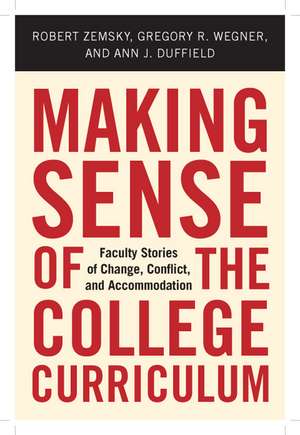Making Sense of the College Curriculum: Faculty Stories of Change, Conflict, and Accommodation
Autor Robert Zemsky, Gregory R Wegner, Ann J. Duffielden Limba Engleză Hardback – 8 iun 2018 – vârsta ani
Readers of Making Sense of the College Curriculum expecting a traditional academic publication full of numeric and related data will likely be disappointed with this volume, which is based on stories rather than numbers. The contributors include over 185 faculty members from eleven colleges and universities, representing all sectors of higher education, who share personal, humorous, powerful, and poignant stories about their experiences in a life that is more a calling than a profession. Collectively, these accounts help to answer the question of why developing a coherent undergraduate curriculum is so vexing to colleges and universities. Their stories also belie the public’s and policymakers’ belief that faculty members care more about their scholarship and research than their students and work far less than most people.
Preț: 280.84 lei
Nou
Puncte Express: 421
Preț estimativ în valută:
53.74€ • 56.26$ • 44.47£
53.74€ • 56.26$ • 44.47£
Carte indisponibilă temporar
Doresc să fiu notificat când acest titlu va fi disponibil:
Se trimite...
Preluare comenzi: 021 569.72.76
Specificații
ISBN-13: 9780813595023
ISBN-10: 0813595029
Pagini: 200
Dimensiuni: 152 x 229 x 23 mm
Greutate: 0.43 kg
Ediția:First Edition, First Edition
Editura: Rutgers University Press
Colecția Rutgers University Press
ISBN-10: 0813595029
Pagini: 200
Dimensiuni: 152 x 229 x 23 mm
Greutate: 0.43 kg
Ediția:First Edition, First Edition
Editura: Rutgers University Press
Colecția Rutgers University Press
Notă biografică
ROBERT ZEMSKY currently serves as the chair of the Learning Alliance and was a member of the U.S. Secretary of Education’s Commission on The Future of Higher Education. He is the author of several books, including Checklist for Change: Making American Higher Education a Sustainable Enterprise (Rutgers University Press).
GREGORY R. WEGNER is the director of program development at the Great Lakes Colleges Association.
ANN J. DUFFIELD is a strategic planning and communications consultant to colleges and universities and serves on the board of trustees of The Sage Colleges in Troy and Albany, New York.
GREGORY R. WEGNER is the director of program development at the Great Lakes Colleges Association.
ANN J. DUFFIELD is a strategic planning and communications consultant to colleges and universities and serves on the board of trustees of The Sage Colleges in Troy and Albany, New York.
Cuprins
Preface: An Exercise in Sense Making
Section I: Defining the Task
Introduction: It's a Riddle After All
Faculty Voice: Hard Conversations
Section II: Passions
1 I Am a Bridge
Faculty Voice: Taking Ownership
2 Why We Do What We Do
Faculty Voice: Hidden among the Artifacts
Faculty Voice: An Experiment in Experiential Learning
Section III: Adaptations
3 Flying Solo
Faculty Voice: Practice Makes Perfect
Faculty Voice: Being a Doula
4 Change Is All About Us
Faculty Voice: Nope, Too Busy
5 Losses and the Calculus of Subtraction
Faculty Voice: Look, It’s a Course…It’s a Major…No, It’s SUPERMAJOR!
Section IV: Frustrations
6 The Cost Conundrum
Faculty Voice: Forty Years in the Desert
Faculty Voice: Touching the Third Rail
7 Barriers
Faculty Voice: Stepping into the Fray
Section V: Conclusions
8 The Road Not Traveled
References
Section I: Defining the Task
Introduction: It's a Riddle After All
Faculty Voice: Hard Conversations
Section II: Passions
1 I Am a Bridge
Faculty Voice: Taking Ownership
2 Why We Do What We Do
Faculty Voice: Hidden among the Artifacts
Faculty Voice: An Experiment in Experiential Learning
Section III: Adaptations
3 Flying Solo
Faculty Voice: Practice Makes Perfect
Faculty Voice: Being a Doula
4 Change Is All About Us
Faculty Voice: Nope, Too Busy
5 Losses and the Calculus of Subtraction
Faculty Voice: Look, It’s a Course…It’s a Major…No, It’s SUPERMAJOR!
Section IV: Frustrations
6 The Cost Conundrum
Faculty Voice: Forty Years in the Desert
Faculty Voice: Touching the Third Rail
7 Barriers
Faculty Voice: Stepping into the Fray
Section V: Conclusions
8 The Road Not Traveled
References
Recenzii
“Interviews of nearly 180 faculty at a diverse range of colleges and universities demonstrate an inspiring commitment to teaching and to doing whatever it takes to improve student learning. Yet this commitment has not translated into the kind of curricular reform our colleges and our society need if higher education is to be more accessible and effective. The authors, in candidly recounting faculty stories of frustrating failure as well as joyful success, provide important new insights into the many exasperating barriers to broader curricular change; impediments which can only be overcome by a new kind of partnership among faculty, institutional decision makers, and education leaders.”
“There has been an on-going national conversation about what is taught in the higher education classroom and how much it matters. Making Sense of the College Curriculum responds strongly and directly to the conversation by offering a critical assessment of what some of the most committed teachers in higher education aspire to do in modernizing the curriculum. It places balanced emphasis on matters of racial and other social differences, the influence of social media, and the existence of instructional and other technology that have shaped the contemporary challenge of higher education teaching. It also delivers a clear message to faculty that thinking in much the same way over time about pedagogy is perilous because students are coming to the classroom each semester, academic year, and decade with different interests, capacities, and expectations about what higher educational learning is all about. Hence, for dedicated instructors sensitivity, self-awareness, and preparedness for adaption must be the constants.”
"Making Sense of The College Curriculum is a useful start about how to make a coherent college curriculum."
Descriere
Over 185 faculty members from eleven colleges and universities share personal, humorous, powerful, and poignant stories about their experiences in higher education. Collectively, these accounts help to answer the question of why developing a structured and coherent undergraduate education is such a vexing challenge for colleges and universities.
